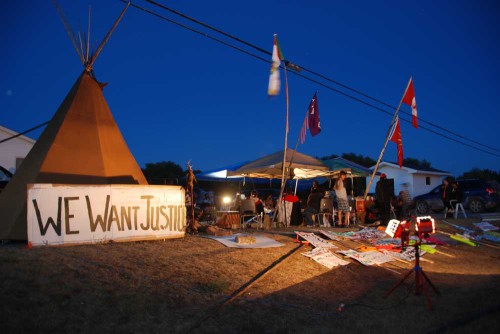To the Expositor:
There were inaccuracies in Michael Erskine’s article ‘Huron chiefs seek accounting of treaty funds’ (page 1, September 12).
He writes that by the treaty the tribes which signed it agreed to “share their territory.” This is wrong. As the treaty says, they agreed to “fully, freely and voluntarily surrender, cede, grant and convey’ to the Crown all of their “right, title and interest” in and to the lands surrendered, except the reservations they retained and with the qualification that they could hunt and fish on the lands surrendered.
There was no talk of “sharing” in the treaty deliberations and no mention of that in the treaty. This notion of “sharing the land” is a very recent concept basically invented by modern, romantic re-interpreters of Canadian history and given some legitimacy by equally very recent Supreme Court of Canada decisions.
The treaty does contemplate that the Crown might, at its sole discretion, increase the fixed annuity paid to individual Natives “…provided that the amount paid to each individual shall not exceed the sum of one pound Provincial in any one year, or such sum as Her Majesty may be graciously pleased to order.”
In no way does this wording suggest or promise any guaranteed raise in the fixed annuity or provide any “revenue stream” or any form of “revenue sharing” as wrongly asserted by the chiefs quoted in the article. No one even dreamt of that at the time.
But it’s no doubt true, as Chief Mahdahbee is quoted as saying that Robinson Huron Natives have not got what they bargained for from the treaty. What they bargained for in exchange for surrendering their lands was an annuity of 96 cents each (increased to $4 each in 1874), reservations and the right to hunt and fish on the surrendered lands.
What they have actually got is a lot more than they bargained for.
Over the many years since the treaty was signed the Canadian people, through their federal and provincial governments, have more than just honoured the treaty. They have, in more than reasonable fulfillment of their fiduciary and “Crown honour” obligations, granted countless, significant additional benefits to Natives, well over and above the treaty, for which there is no basis whatsoever in the wording of the treaty itself, and which go far beyond the original intent of it. In this way and others the Canadian people, through their governments, have acted more than honourably in the implementation of the Crown’s obligations under the treaty.
As evidenced by the website of Indian and Northern Affairs Canada, under the heading “You Wanted to Know: Federal Programs and Services for Registered Indians” free medical and dental care, massive grants for reserve infrastructure, funding schools, grants for post-secondary education, special business startup grants and loans, housing assistance grants and loans, programs for native youth and women, employment initiatives, funding native land claim lawsuits, funding the bulk of their “consult and accommodate” expenses, funding the various associations and federations that make up such a large and vocal part of the Native elites’ lobbying efforts, funding Native urban Friendship Centres, funding television and radio programs for Natives—these programs and initiatives constitute only a few examples of the very generous and honourable dealings of the people of Canada, through their governments, towards our Native fellow citizens, dealings which go way beyond the letter, spirit and original intent of the Robinson Huron treaty, and all the other old treaties.
Yours truly,
Peter Best, lawyer
Espanola





